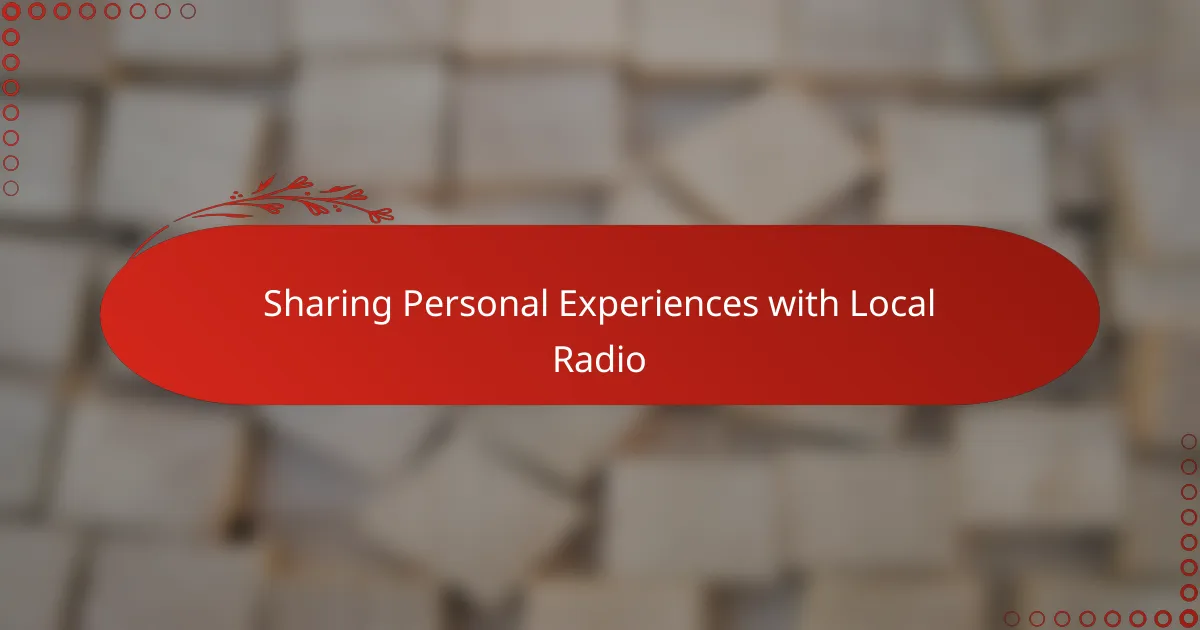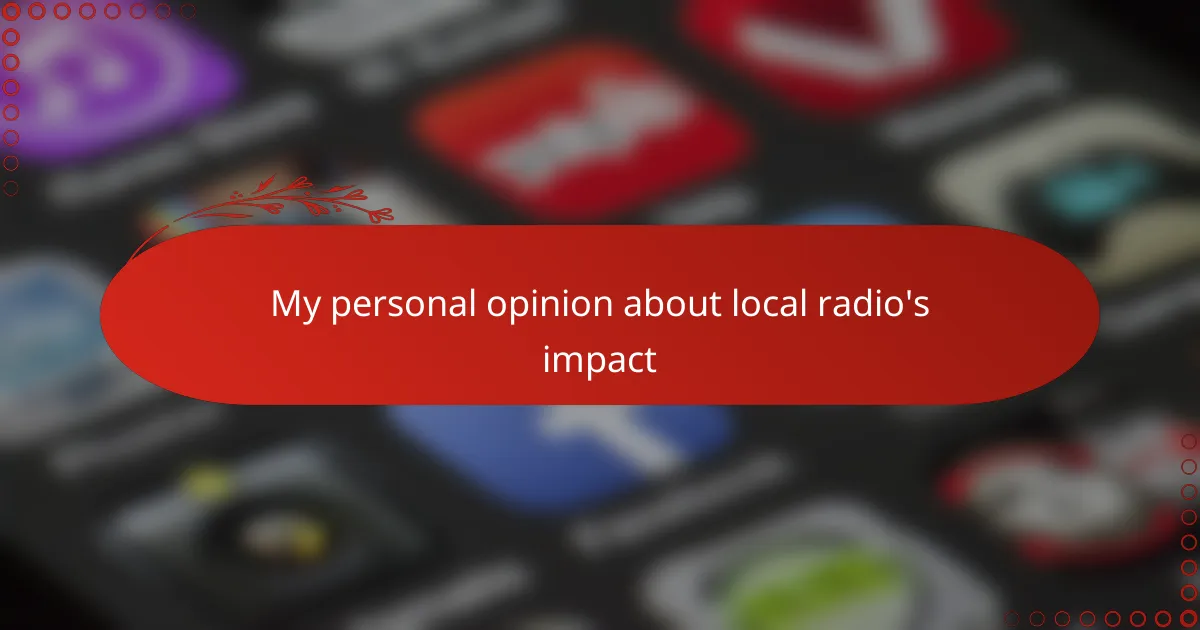Key takeaways
- Local radio provides a personal connection to the community, serving as a trusted source of information, entertainment, and shared experiences.
- It plays a vital role in amplifying local voices and stories, fostering community identity and pride, especially during critical events.
- Content quality on local radio is defined by authenticity and relevance, making it a rich experience for listeners compared to national broadcasts.
- The future of local radio lies in balancing technology and community focus, ensuring it remains a personal and engaging medium for its audience.

Understanding Radio Broadcasting Basics
When I first started tuning into local radio stations, I didn’t realize how much technical work went into broadcasting. Understanding the basics—like frequency modulation and signal range—helped me appreciate the effort behind those seemingly simple voices on the air. Have you ever wondered how a radio signal travels through the air to land perfectly in your car or kitchen?
Radio broadcasting, at its core, is about sending audio content over electromagnetic waves, making it accessible to anyone with a receiver. This simplicity masks a complex dance of equipment, regulations, and creative talent working behind the scenes. Thinking about it now, it almost feels like magic how communities connect through a shared frequency.
To me, these basics highlight why local radio has such a unique charm; it’s personal and immediate. Unlike digital streams that can feel distant, local broadcasts create a sense of belonging just by being tuned in on the right frequency. Do you get that feeling too when your favorite local host is on the air?

Exploring Local Radio’s Role
When I think about local radio’s role, it strikes me how deeply it roots itself in the fabric of the community. It’s more than just playing music or sharing news; it’s about giving voice to neighbors, local events, and stories that might never reach larger media outlets. Have you ever noticed how hearing that familiar local voice feels like catching up with an old friend?
Local radio often steps in where bigger stations can’t. From emergency alerts during storms to promoting small businesses, it serves as a lifeline that’s both timely and trusted. I remember a time when a sudden power outage cut off internet and phone lines in my town—but local radio kept everyone informed, calm, and connected.
What fascinates me is the way local radio shapes the community’s identity. It creates a shared experience—songs, announcements, voices—that everyone in the area recognizes and values. Don’t we all crave that sense of belonging, especially in an age where so much media feels generic and far removed? Local radio fills that gap in a truly personal way.

Analyzing Local Radio’s Community Impact
When I reflect on local radio’s community impact, what stands out most is its ability to bring people together. It’s not just about information—it’s about connection. Have you ever noticed how a single local song or shout-out can spark conversations across neighborhoods?
From my experience, local radio often acts like a communal heartbeat. During festivals or town meetings, the station’s energy feels contagious, making me realize how it fuels local pride. Isn’t it amazing how something so simple can strengthen the bonds we share with our neighbors?
What I find truly powerful is how local radio amplifies voices that otherwise might get lost. It listens to everyday stories and celebrates local heroes, making the community feel seen and valued. Do you think this personalized attention is what keeps local radio relevant despite all the digital noise around us?

Evaluating Content Quality on Local Radio
When I evaluate the content quality on local radio, I often find myself tuning in not just for entertainment but for authenticity. There’s a raw, unscripted feel to local programs that larger stations sometimes lack, making every segment feel like a genuine conversation rather than polished broadcasting. Have you ever caught a local host sharing a personal story or a community concern in a way that felt so relatable it stayed with you all day?
One thing I’ve noticed is that local radio thrives when it balances variety with relevance. From playing neighborhood musicians to discussing issues that matter directly to listeners, this tailored approach often sets the bar for meaningful content. It makes me wonder: is this deeply rooted local focus the secret ingredient that keeps listeners coming back, even when they could easily switch to national channels?
That said, content quality isn’t just about what’s said but how it’s presented. I appreciate when local stations put care into not repeating ads excessively or delivering news with clarity and respect. These little details speak volumes about a station’s commitment to its audience and show that quality isn’t an accident—it’s a deliberate choice. Would you agree that those thoughtful touches make listening a much richer experience?

Comparing Local and National Radio Influence
When I compare local and national radio, I can’t help but notice how local stations create a more intimate listening experience. National radio often dazzles with big-name guests and polished production, but it sometimes feels like a show put on for the masses rather than a conversation with a community. Have you ever felt that slight distance when hearing a national host talk about places you don’t really relate to?
From my perspective, the influence of local radio lies in its relevance to daily life—the weather report that’s spot on for my neighborhood, the local band getting airtime, or even those quick shout-outs to nearby businesses. National stations cover broad topics and major events, sure, but they rarely capture the small moments that make a town feel like home. Isn’t it those details that truly stick with us?
Yet, I recognize that national radio has the power to shape cultural trends and reach millions at once, something local stations could only dream of. Still, I personally believe that local radio’s strength is in nurturing community identity and connection, which, in my experience, leaves a deeper and more lasting impact on listeners. Do you think there’s a balance where both can coexist, each enriching listeners in different ways?

Sharing Personal Experiences with Local Radio
I remember one rainy afternoon when the usual hum of local radio was the only sound filling my kitchen. That familiar voice reading the news felt like a comforting presence, reminding me that I wasn’t alone even during a storm. Have you had moments where a simple broadcast seemed to turn into a personal conversation just for you?
Sometimes, local radio connects me to my community in ways no other medium can. I once called into a station to share a story about a neighborhood event, and hearing it aired made me feel truly part of something bigger. Isn’t it powerful when your own words become part of the shared local experience?
What strikes me most is how local radio hosts seem to know exactly what their listeners need, almost like they’re friends who just get it. That personal touch keeps me coming back, week after week. Don’t you find there’s a special warmth in hearing someone speak directly to your community’s heartbeat?

Reflecting on Local Radio’s Future Potential
Thinking about local radio’s future potential, I believe it still has a unique role to play, especially as technology evolves. While streaming and podcasts are booming, local stations can leverage their deep community ties to offer something digital platforms can’t—a real-time, local pulse. Have you noticed how local radio still surprises me by adapting quickly, like when they launched online streaming alongside traditional broadcasts?
From my perspective, the future could be even brighter if local radios embrace new interactive tools—imagine calling in not just by phone but through apps that let listeners share stories or vote on songs instantly. That blend of old-school intimacy and modern tech excites me because it could deepen listener engagement without losing that personal warmth. Do you think adding this kind of immediacy would make local radio feel even more alive?
Yet, I also wonder if local stations will keep the community focus alive as they grow technologically. It’s easy to get caught up competing with big networks, but I feel the magic is in staying local and authentic. From what I’ve seen, stations that maintain those roots while carefully innovating are the ones that truly stand the test of time. Would you agree that balancing tradition with innovation is the key to local radio’s lasting impact?
